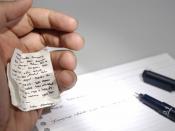Your social studies teacher smiles as he passes out the big test. But you have a giant lump in your stomach. You were so busy yesterday that you forgot to bring your book home to study! And there Brittany, the class brain, sitting right beside you. Maybe you should peek at a few of her answers, just to make sure you pass. After all, you know you could have done well on this test?i>if you had studied.
What would you do?
A lot of kids would probably cheat. Two years ago, the Josephson Institute of Ethics in California surveyed more than 10,000 middle school students. Forty-two percent of the 10 to 12-year-olds admitted they had cheated on a test at least one time during the past year. That means if you have 25 kids in your social studies class, ten of them might have cheated at one time or another.
Jacob*, 13, says "most kids" at his school cheatncluding him. "Sometimes you get in late and you don have time to study or do homework," he says. "So you cheat!"
Other kids feel pressured. "You want somebody to be proud of you," says Carla, 12. "And you are stressed out from tons of homework, reports, and tests. You can only do so much."
A problem that grows
Carole Kennedy, principal of a middle school in Columbia, Missouri, says she understands why kids might be tempted to cheat. But she believes it a huge mistake. "If you cheat, you're not learning," she says. "The only thing you'll become good at is cheating!"
Kennedy says it's a problem that starts small. "Usually it begins in third or fourth grade, with spelling words written on your hand or another piece of paper," she says. "Later, it copying homework or tests. You see other...


